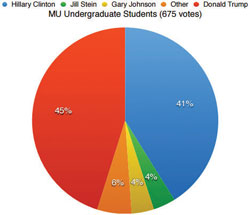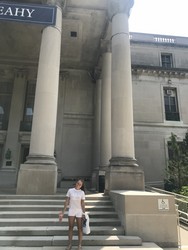Federal Debt Could Affect College Students Sooner Rather Than Later
Since the beginning of the economic crisis that has plagued the United States’ economy for the past several years, the discussion of ballooning federal deficits and the overall federal government debt has really gained importance.
The federal debt is a measure of the accumulation of all federal deficits in the past since America’s constitution went into effect. These deficits occur when the government spends more than what they are collecting in revenue or taxes. The government finances the extra money they need by selling treasury notes (essentially loans) to investors and countries from all over the world. The government then pays interest on those treasury notes just as a college student pays interest on college loans until they can pay it back entirely.
The “Debt Crisis” is an issue that transcends partisanship because presidents and congressional members of both parties have had ample opportunities to address the issue, but none have risen to the occasion.
Today, the government finds itself in a difficult position where it must find a strategy that can ease the concerns of businesses, investors, and everyday Americans without interrupting the already frail economic recovery.
In a presidential election year, the issue of the rising national debt has become a political talking point that has been tossed around carelessly by members of both parties. The issue is undoubtedly important, but when juxtaposed with the problem of high unemployment, questions arise regarding which one should be prioritized.
When asked the importance of the national debt and how it could affect University students like her, Monia Abou Ghali, a senior political science major currently interning in Washington D.C. mentioned that the issue caused her concern because she was, “afraid that college students would have to assume the burden of the debt in the future through higher taxes.”
Abou Ghali has reason to be concerned. But couldn’t an argument be made that instead of focusing so much attention on the debt, the government should draw up, debate, and sign into law policies that will create jobs?
The American economy follows a sort of “domino effect” pattern in that when one indicator such as unemployment or interest rates changes, it affects other sectors of the economy as well. This is why by aiding in the creation of private sector jobs in all industries; more people would be collecting paychecks, paying taxes, and spending money. This in turn would allow the American economy to begin expanding again, businesses could grow and hire more people, and the government would consequently collect more revenues without even having to raise tax rates on anyone.
When asked about the way that the debt could affect her, Delila Osmankovic, a senior economics and finance major responded that she “Feared that the attention on the debt would influence policymakers and lead to cuts in education and financial aid for college students.”
Dr. Nahid Aslanbeigui of the Economics, Finance, and Real Estate Department noted that the fears of students like Delila are very real. She believed that if the government begins to cut its expenditures, “Education grants and financial aid could also be reduced, causing students to incur more debt.”
Despite the economic conditions of the American economy, the United States has enjoyed the benefits of investor confidence. Even through the recession, the American dollar remained the most trusted currency in the world. A lack of confidence would have been seen statistically through higher interest rates being demanded for government bonds.
According to the Treasury- Direct website of the U.S. Treasury Department, interest rates on interest-bearing debt was at an average of 2.587 percent. In comparison to regular Americans and college students, that is less than people pay on home mortgages and student loans.
When asked about how the government should address the debt problem, Aslanbiegui stated that “Since the government’s current borrowing costs are low, it could borrow to stimulate the economy. When the economy begins to grow, deficits will automatically go down assuming everything else remains constant.”
Democrats and Republicans have attacked one another because of their failure to address the issue of the debt. Republicans blame President Obama for increasing the debt by introducing new government spending for programs such as the healthcare reform, the auto bailout, and the economic stimulus. On the contrary, Democrats criticize Republicans for being dishonest about their spending records. Under former President George W. Bush, government spending and the debt also increased as a result of the wars in Iraq and Afghanistan, the TARP fund that bailed out large financial companies like AIG, and unpaid tax cuts for higher income earners.
Although typical of election year rhetoric, it is the sincere hope of American workers, business owners, and investors that the bickering stops and bipartisanship begins.
For college students all over the United States, it might make the difference between finding a job, paying higher interest rates for student, mortgage, and car loans, or having to pay higher taxes in the future.



